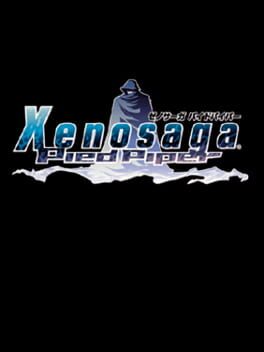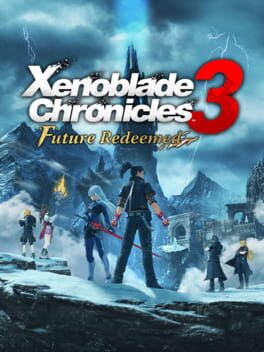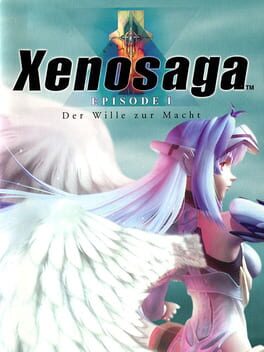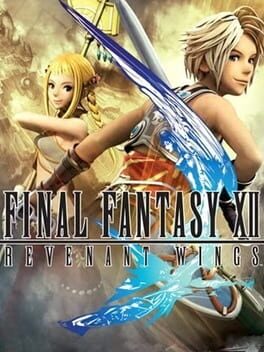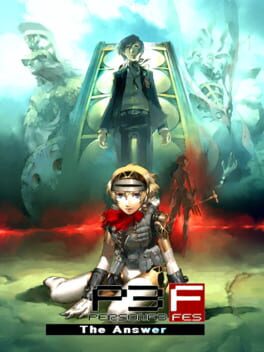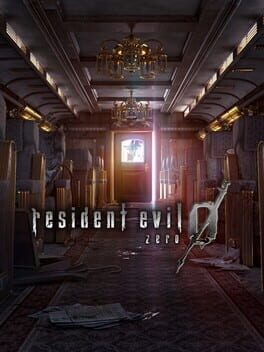Colethecutedog
7 reviews liked by Colethecutedog
Xenosaga: Pied Piper
2004
Shoutouts to ValakTurtles on Youtube for uploading a captioned playthrough of this game.
Xenosaga Pied Piper is a short side-story released for the Vodafone 6 and written by Kaori Tanaka (Takahashi's wife an co-creator of the Xenoseries). It dives into the backstory of Ziggy at the time he was known as Jan Sauer, a police officer specialized in investigating crime related to the U.M.N Network (the virtual reality space which serves as both the Internet and the main mean of interdimensional travel in the universe of the series).
Since the game was released for a now defunct platform and no dump of the game has been uploaded online, it is effectively lost media and will probably remain as such for a long time unless someone manage to archive it.
Thus I had to resolve to watching a playthrough of the game with subtitles, however from the looks of it, it seems to attempt to translate the gameplay system of Xenosaga 1 on a mobile device and they seem to have done more than a commandable work at it even with the limited presentation which looks like something that could've come out of RPG Maker 2003.
Ziggy is a character that I already liked in the main games and the main series only partially hinted at his past and what might've caused him to commit suicide and eventually get recycled as a cyborg. This game is meant to tell that story in a more direct manner and as such does a really decent job at establishing Ziggy's backstory and the traumatic events that transpired here as well as his relationship to the mysterious "Voyager" a hooded figure who showed up briefly at the end of Xenosaga 2 and which Ziggy to have a vendetta against.
The script of the game is really good as it is to be expected by Kaori Tanaka's excellent work on the main series, however it kinda falls short as a mystery game. The identity of Voyager is way too obvious if you saw his design in Xenosaga 2 and can manage to put 2 and 2 together, so a lot of the plot become kinda sluggish certainly not helped by both the shoddy presentation which makes a lot of the more emotional bit of the game fall a bit flat.
The OST in particular sounds like the Arabic Nokia Tune which was probably to be expected given the platform this was published on but it really takes away from some of the scenes in the game.
I still enjoyed it in the end however, especially as a deep dive into the past events of the series as well as to complete Ziggy's character arc that I'm sure will conclude in an interesting manner in Xenosaga 3 (as he seem to have found another family with Momo and her mom which is a situation reminiscent of what he went through in that game).
I'm not gonna give a score to this one seeing as I haven't actually played the game but it's a neat little curiosity and company piece to the trilogy that I wish could be playable in some way in the future, it's nonetheless impressive how solid the game seems to be, an RPG on mobile phone is pretty damn impressive all things considered especially one taking place in a setting as rich and dense as the one from Xenosaga.
But still... getting stuck on mobile is some grade A Nomura bullshit
Ziggy isn't a step dad, he's the dad who stepped up !
Xenosaga Pied Piper is a short side-story released for the Vodafone 6 and written by Kaori Tanaka (Takahashi's wife an co-creator of the Xenoseries). It dives into the backstory of Ziggy at the time he was known as Jan Sauer, a police officer specialized in investigating crime related to the U.M.N Network (the virtual reality space which serves as both the Internet and the main mean of interdimensional travel in the universe of the series).
Since the game was released for a now defunct platform and no dump of the game has been uploaded online, it is effectively lost media and will probably remain as such for a long time unless someone manage to archive it.
Thus I had to resolve to watching a playthrough of the game with subtitles, however from the looks of it, it seems to attempt to translate the gameplay system of Xenosaga 1 on a mobile device and they seem to have done more than a commandable work at it even with the limited presentation which looks like something that could've come out of RPG Maker 2003.
Ziggy is a character that I already liked in the main games and the main series only partially hinted at his past and what might've caused him to commit suicide and eventually get recycled as a cyborg. This game is meant to tell that story in a more direct manner and as such does a really decent job at establishing Ziggy's backstory and the traumatic events that transpired here as well as his relationship to the mysterious "Voyager" a hooded figure who showed up briefly at the end of Xenosaga 2 and which Ziggy to have a vendetta against.
The script of the game is really good as it is to be expected by Kaori Tanaka's excellent work on the main series, however it kinda falls short as a mystery game. The identity of Voyager is way too obvious if you saw his design in Xenosaga 2 and can manage to put 2 and 2 together, so a lot of the plot become kinda sluggish certainly not helped by both the shoddy presentation which makes a lot of the more emotional bit of the game fall a bit flat.
The OST in particular sounds like the Arabic Nokia Tune which was probably to be expected given the platform this was published on but it really takes away from some of the scenes in the game.
I still enjoyed it in the end however, especially as a deep dive into the past events of the series as well as to complete Ziggy's character arc that I'm sure will conclude in an interesting manner in Xenosaga 3 (as he seem to have found another family with Momo and her mom which is a situation reminiscent of what he went through in that game).
I'm not gonna give a score to this one seeing as I haven't actually played the game but it's a neat little curiosity and company piece to the trilogy that I wish could be playable in some way in the future, it's nonetheless impressive how solid the game seems to be, an RPG on mobile phone is pretty damn impressive all things considered especially one taking place in a setting as rich and dense as the one from Xenosaga.
But still... getting stuck on mobile is some grade A Nomura bullshit
Ziggy isn't a step dad, he's the dad who stepped up !
Takahashi didn't learn from Gears at all huh.
Xenosaga Episode I is an odd one to talk about as its own game, in a narrative sense at least. Takahashi wanted to make sure his six part epic got completed this time so he started right at episode 1 rather than 5. Ironically, episode 5 would turn out to be a far more digestible single narrative, probably because Takahashi knew it'd likely be the only one he could put out.
Much of Episode I is big exposition dumps and setting up the general setting for whats to come later, so much so that they even have to throw it into the credits because the game has so much to get through. I honestly don't mind this too much, to a point. I love the dedication to making this world feel truly real and messy, with a wide variety of different factions and characters each with unique goals interacting together. You get a real sense of history here, like the best moments of Gears.
Where I think it begins to harm this individual chapter is that I don't think as a singular narrative what happens here is very satisfying. You save the day and blow up the big superweapon but in terms of any character work even by the end of the game you still feels like you are waiting for their arcs to really get moving. MOMO and Jr. get some forward momentum, and the Shion/KOS-MOS bit at the end is good but it doesn't feel like enough. In a world where this is the only Xenosaga game I think it would stand as a massive failing of the game. Thankfully there will be more, less than the 6 that Takahashi intended so I really can't wait to see how compromised those get, and how things could have been prevented by a more economic first part.
In terms of presentation however, I think it's a pretty massive win. For a 2002 JRPG with 7 hours of fully voiced 3-D animated cutscenes it says a lot that they still look and sound good. Crispin Freeman as Albedo is obviously the stand-out role but it's a very strong job from everyone involved. Making this even better is the Mitsuda score, which has a true sense of scale in its sound that utterly dwarfs his contemporaries.
One aspect of the score which I find to be a mixed bag is the lack of it in exploration. I actually find it for the most part to fit the tone of the game, but I think it needed a few more moments of contrast to truly sell that. The single battle theme (until the literal final boss) on the other hand, as good as that song is, I could do without hearing it for the next long while.
Gameplay wise I actually think it's a pretty solid system! Allows for lots of strategy, each of the six characters feels distinct and actually could be of use, allowing replays to be distinct. I'm usually rather impatient but I think my only critique of the speed of this combat is that I wish I could skip over some of the longer tech attack animations, as cool as they are.
There's two aspects of this system that I think hold it back from being truly strong. The first is the boost system. I think it mostly works quite well for your characters doing it, but the ways in which enemies boost feel like they are playing an entirely different game. They are able to boost at will, overriding your boosts while you cannot override theirs. You also can't see the enemies gauge so it feels particually cheap if they chain them together.
The second one is one part of the leveing system. While I actually really enjoy that the points are split into 3 distinct parts so you can give each aspect of the characters you level up a higher level of strategy, it is absurd that you cannot see the full path of abilities each character can level into. With how expensive the ether abilities are to unlock, you can spend a long time leveling up E-points to just end up with a skill less good than one you could have had earlier for cheaper in the tree. Being able to see the full tree and full range of tech attacks would allow for better planning. As it was I ended up saving all my point boosting items till the end just because I didn't want to waste them on stuff that wouldn't be useful to me in the end.
These are both very fixable problems however, and I would say I am excited to see how future games fix these but everything I have heard about Episode II puts the fear of god in me.
tl:dr takahashi you gotta hide your influences a bit harder you cannot just name the guy who invented androids "tyrrell" you hack
Xenosaga Episode I is an odd one to talk about as its own game, in a narrative sense at least. Takahashi wanted to make sure his six part epic got completed this time so he started right at episode 1 rather than 5. Ironically, episode 5 would turn out to be a far more digestible single narrative, probably because Takahashi knew it'd likely be the only one he could put out.
Much of Episode I is big exposition dumps and setting up the general setting for whats to come later, so much so that they even have to throw it into the credits because the game has so much to get through. I honestly don't mind this too much, to a point. I love the dedication to making this world feel truly real and messy, with a wide variety of different factions and characters each with unique goals interacting together. You get a real sense of history here, like the best moments of Gears.
Where I think it begins to harm this individual chapter is that I don't think as a singular narrative what happens here is very satisfying. You save the day and blow up the big superweapon but in terms of any character work even by the end of the game you still feels like you are waiting for their arcs to really get moving. MOMO and Jr. get some forward momentum, and the Shion/KOS-MOS bit at the end is good but it doesn't feel like enough. In a world where this is the only Xenosaga game I think it would stand as a massive failing of the game. Thankfully there will be more, less than the 6 that Takahashi intended so I really can't wait to see how compromised those get, and how things could have been prevented by a more economic first part.
In terms of presentation however, I think it's a pretty massive win. For a 2002 JRPG with 7 hours of fully voiced 3-D animated cutscenes it says a lot that they still look and sound good. Crispin Freeman as Albedo is obviously the stand-out role but it's a very strong job from everyone involved. Making this even better is the Mitsuda score, which has a true sense of scale in its sound that utterly dwarfs his contemporaries.
One aspect of the score which I find to be a mixed bag is the lack of it in exploration. I actually find it for the most part to fit the tone of the game, but I think it needed a few more moments of contrast to truly sell that. The single battle theme (until the literal final boss) on the other hand, as good as that song is, I could do without hearing it for the next long while.
Gameplay wise I actually think it's a pretty solid system! Allows for lots of strategy, each of the six characters feels distinct and actually could be of use, allowing replays to be distinct. I'm usually rather impatient but I think my only critique of the speed of this combat is that I wish I could skip over some of the longer tech attack animations, as cool as they are.
There's two aspects of this system that I think hold it back from being truly strong. The first is the boost system. I think it mostly works quite well for your characters doing it, but the ways in which enemies boost feel like they are playing an entirely different game. They are able to boost at will, overriding your boosts while you cannot override theirs. You also can't see the enemies gauge so it feels particually cheap if they chain them together.
The second one is one part of the leveing system. While I actually really enjoy that the points are split into 3 distinct parts so you can give each aspect of the characters you level up a higher level of strategy, it is absurd that you cannot see the full path of abilities each character can level into. With how expensive the ether abilities are to unlock, you can spend a long time leveling up E-points to just end up with a skill less good than one you could have had earlier for cheaper in the tree. Being able to see the full tree and full range of tech attacks would allow for better planning. As it was I ended up saving all my point boosting items till the end just because I didn't want to waste them on stuff that wouldn't be useful to me in the end.
These are both very fixable problems however, and I would say I am excited to see how future games fix these but everything I have heard about Episode II puts the fear of god in me.
tl:dr takahashi you gotta hide your influences a bit harder you cannot just name the guy who invented androids "tyrrell" you hack
Persona 5 Royal
2019
I really did give Revenant Wings a decent shot, I tried to like it. But it... doesn't work. RTS on DS is a fun idea on paper, but it ends up panning out pretty poorly, the tiny screen making it a pain to micromanage all your units. This game could have really benefitted from a proper gambit system like the original game, instead of the butchered version of it we got. Doesn't help that maps lag very frequently when there's more than a few units on screen, making the experience super unpleasant.
I dropped it after a few chapters, which was a bit of a shame as I did like hearing FF12's music on the DS sound chip, but did want to see where the story went at least, so I watched it. It's... not great. Tonally it's completely off from FF12—which was one of that game's strengths—and the narrative is really simplistic. The lore is somewhat interesting, but again pales in comparison to FF12. Worst part of the story was the misunderstanding with Balthier, which was just a ridiculous way of padding out the game and creating drama.
I guess you could say this does more with Vaan and Penelo than FF12, but... I dunno, this game feels more like FF12 fanfiction than any kind of sequel or even side story. I don't have much more to say tbh, Revenant Wings is just pretty mediocre in every area other than music (which isn't even original!)
I dropped it after a few chapters, which was a bit of a shame as I did like hearing FF12's music on the DS sound chip, but did want to see where the story went at least, so I watched it. It's... not great. Tonally it's completely off from FF12—which was one of that game's strengths—and the narrative is really simplistic. The lore is somewhat interesting, but again pales in comparison to FF12. Worst part of the story was the misunderstanding with Balthier, which was just a ridiculous way of padding out the game and creating drama.
I guess you could say this does more with Vaan and Penelo than FF12, but... I dunno, this game feels more like FF12 fanfiction than any kind of sequel or even side story. I don't have much more to say tbh, Revenant Wings is just pretty mediocre in every area other than music (which isn't even original!)
Resident Evil 0
2016
A very fun game that leaves a positive lasting impression -
however, the game prevents itself from being a 5-star game by its insistence on retaining its archaic controls, not providing an item box or any ability to expand storage, and by THE DAMN INK RIBBONS. Above all else, I HATED having to schedule and plan out my gameplay sessions to make sure I've made enough in-game progress to earn another save. My other gripes include the door-load gimmick, which is just a waste of time on PS5, and the amount of self-imposed fetch-quests (because I have to leave all my key items behind just to be able to hold a gun and ammo) really took me out of parts of the game.
however, the game prevents itself from being a 5-star game by its insistence on retaining its archaic controls, not providing an item box or any ability to expand storage, and by THE DAMN INK RIBBONS. Above all else, I HATED having to schedule and plan out my gameplay sessions to make sure I've made enough in-game progress to earn another save. My other gripes include the door-load gimmick, which is just a waste of time on PS5, and the amount of self-imposed fetch-quests (because I have to leave all my key items behind just to be able to hold a gun and ammo) really took me out of parts of the game.
